“Why not seize the pleasure at once? How often is happiness destroyed by preparation, foolish preparation.” – Jane Austen, Emma
 Welcome to 18th century Derbyshire, England, where several influential families of neglected estates are anxious to change their fortunes. How, you ask? Well, the Fairchild progeny, Elizabeth, and Charles, have permanently moved into Alderley Hall and seek refuge from the melancholy of the lonely countryside. What better way to improve in both rank and status than by romancing these two respectful, and more importantly eligible, siblings?
Welcome to 18th century Derbyshire, England, where several influential families of neglected estates are anxious to change their fortunes. How, you ask? Well, the Fairchild progeny, Elizabeth, and Charles, have permanently moved into Alderley Hall and seek refuge from the melancholy of the lonely countryside. What better way to improve in both rank and status than by romancing these two respectful, and more importantly eligible, siblings?
It’s time to bring all resources to bear. Property staff at the ready! Dust off the best rooms. Repair the most attractive elements of the estate. Invite the most prestigious gentry from our remaining social connections. And of course, prepare the children to be marriageable material.
Have you heard? Romance is in the air!
Gameplay Overview:
Note: This review is based on the 2nd edition printing, which features improved components and gameplay.
Obsession is a worker and tile-placement game comprised of four courtship phases. Each phase finds players hosting an activity based on their available staff, hand of gentry cards, and accessible buildings. The goal in hosting these events is to gain favors such as money, reputation, or additional social connections, which build your hand of gentry cards and provide more hosting options. Once a gentry card is used during a round, it is discarded and cannot be used until players take a pass action to refresh their hand.
Each activity must be attended by the estate’s service team. Certain activities necessitate certain staff, such as the Bowling Green, which requires a footman to attend two gentry members for the event. The gentry, based on their status, may also require attending. The starting family cards do not require this, but many of the cards you will add to your hand over time will require the attention of a lady’s maid or valet. Once used, staff members become expended and will not be available for a period of time.
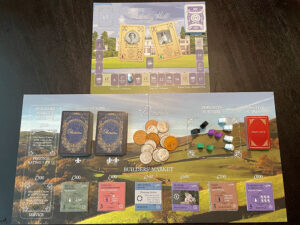
After an activity is hosted, boosting the appeal of the family estate, players then could spend money on building tiles that are available in the market. The additional tiles you can add to an estate will increase in cost based on when they entered the market. A very attractive monument tile may enter at an unreasonable price, but over time as less expensive tiles are purchased, tiles will shift, and the price will decrease.
At the end of each phase is a courtship round—of which there are four in total—where every family measures their estate against the wishes of the Fairchild siblings. One card is drawn from a deck of courtship cards featuring each area of appeal: Essentials, Service, Estate, Prestige, Sporting. These are color-coded and match the building tiles. For example, if a Prestige courtship card is drawn, players count the visible points on all their Prestige tiles. The player with the most points claims their choice of Fairchild sibling card to use until the next courtship.
At the end of the game, a final courtship phase considers all four phases. The player with the estate that appeals to the Fairchilds most will win the final matchmaking event. This, combined with an accounting of points related to estate improvements and social connections, will decide the ultimate winner regardless of who enticed the final courtship.
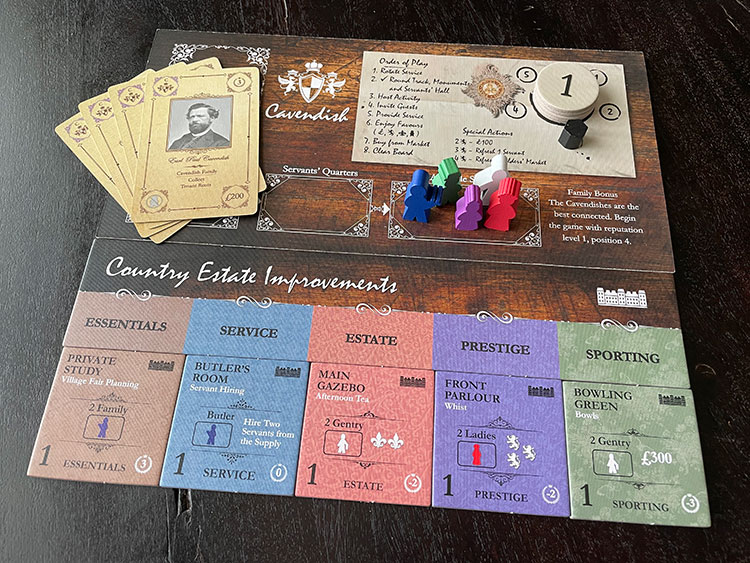
Game Experience:
Obsession, or “How to turn a dry Euro experience into a thematic thrill ride.” But let’s back up just a bit. It’s not hard to imagine that this game is probably not going to appeal to everyone. In fact, the rigid gender roles of the late 18th century and the servant industry may turn some away completely. But I challenge those seeking to immerse themselves in a theme filled with romance, intrigue, and folly: look no further.
Obsession takes Jane Austen and Emily Bronte seriously, and then goes the extra mile by wrapping the experience in a wonderful set of mechanics. There’s tableau-building as you work hard to build the most glorious estate. There’s hand management as you mull over the best gentry card to add to the current hosted event. There’s worker placement as you struggle to keep your servants available for the needs of the estate and the whirlwind of guests coming and going.
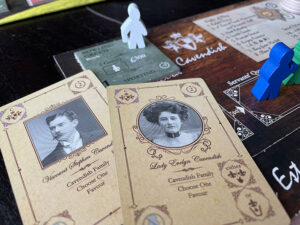
All this activity is rigidly structured, as each turn consists of the same step-by-step guided principles, all of which are channeled by available resources. While you can focus on different avenues of the family, such as increasing reputation or amassing social connections, the goal is to win the hearts of the Fairchild siblings. Ultimately, they are only interested in one area of your estate each phase.
As such, the tug-of-war of gaining esteem sits at the heart of Obsession. As you invite guests to your estate and provide repairs, you’re constantly watching your neighbor from over the hedge to see how many points they have in each area of appeal. If I host afternoon tea with the lady of the house, it will improve my estate Prestige but may see me falling behind on Service. Or maybe I really need to work on village fair planning to improve income, but then my butler will be indisposed to help me hire more staff next round.
The game invites a world of storytelling as you play. Each gentry card, including the family cards, are delightful as they include in-era photography and flavor detail. A picnic on the south lawn may attract a new guest. But look, it’s the local gossip Miss Beatrice Wilton, who upon future play will lower the reputation of the family. Why did Father wave to her as she passed by on her way to town? The scandal!
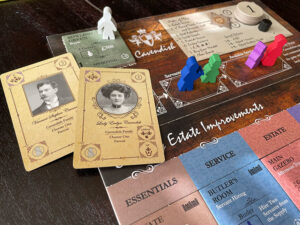
There’s also quite a lot of variety to each play. Whereas families will start with similar meager beginnings, things begin to change quickly as new buildings emerge each round and new gentry guests are added from two different decks of cards. There’s a queue of available staff members that can be added, which caters to different styles of play. Several variant options are included that also allow players to adjust to their gaming tastes.
For example, we prefer to play the game with closed courtship. This means that we do not know what appeals to the Fairchilds until the end of a phase. This requires us to maintain a close race for estate points without knowing which area of appeal will turn up. But the game allows you to play this as an open option, so you’re aware immediately what to work towards, or even a random option in which a die determines when this information appears.
There’s a lot to unpack once you go all in. While the base game is enjoyable, I can see how it may get stale for some after several plays, which is why the expansion is highly recommended. But this is where the largest obstacle comes into play: the rulebook. Unfortunately, the rulebook for this game isn’t as concise as it needs to be, and even after becoming comfortable with the game, I still find myself digging through the rules to find intricacies that are hard to locate. This becomes even more convoluted with the expansion, which adjusts several aspects of the base game and has you referring to different pages to learn about the changes.
Final Thoughts:
Obsession achieves what it sets out to do—emulate the romance and comedy of errors captured by Jane Austen novels while also providing a quality board game experience. For our household, the thrill of storytelling attached to the gameplay elevates this beyond any of its worker and tile placement brethren. There are not many games that fully feel like a labor of love, but here Dan Hallagan’s attention to period detail has won us over. We’ve fallen under the spell of the namesake; consider us fully obsessed!
Final Score: 4.5 Stars – Quick! The Fairchild siblings have arrived. What are you waiting for? Prepare for the romancing. It’s time to break out another game of Obsession.
 Hits:
Hits:
• Thematic and engrossing
• A plethora of inherent storytelling opportunities
• Unique gameplay and variety
Misses:
• The rulebook needs an overhaul
• Strict gender roles and privilege themes
• Copies are currently hard to locate







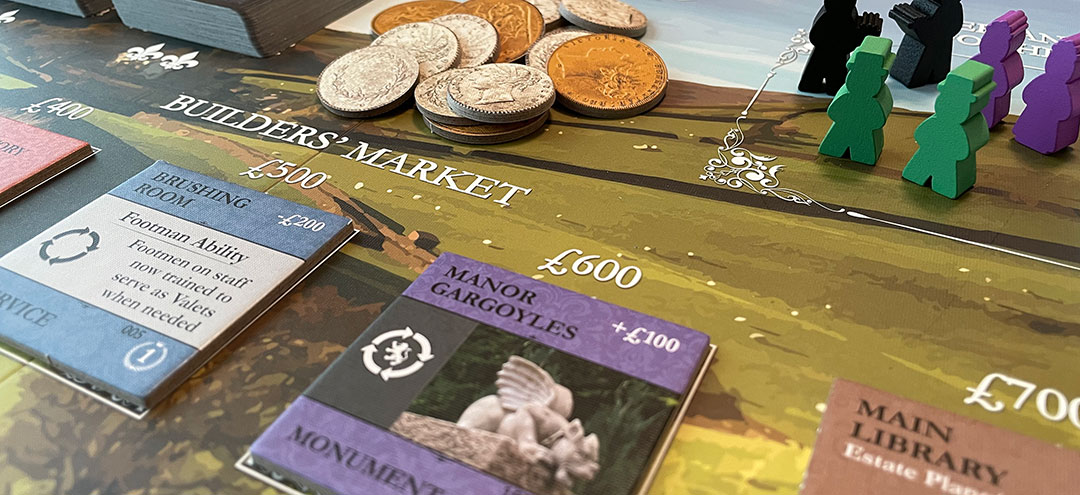















”Strict gender roles and privilege themes” as a miss for a game set in the Victorian age? Just say it aloud – game is not woke enough for me, or better: designers didn’t ‘fix’ the history so snowflakes wouldn’t be offended or something, lol.
You sure got upset at one line in a 4.5 star review. I do wonder if maybe you are misled on who the snowflakes are.
That said, some people probably don’t want to play a game where there are defined roles for men and women. Historically accurate or not, we have learned better as a society how to treat people of all genders. So Brandon’s point that this theme may be viewed through that problematic lens seems reasonable. Sorry you were so easily triggered.
Oh my stars Peeta, thanks for pointing that out! I mean, I entirely missed the part of history class where tile placement and meeples figured heavily into Victorian era culture. And of course absolutely no one transcended gender or class roles in all of recorded history. Clearly I have been enjoying all the wrong board games and should only adhere to those that present themes from a straight white history-rewriting male perspective.
Or – you can crawl back under your rock with your ridiculous views, you soggy macaroni and cheese of a ‘gamer’.